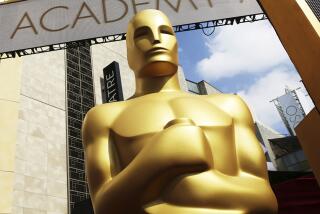The Security Rope Will Not Be Velvet
- Share via
For all you amateur stargazers out there, be forewarned: You’re not invited to Sunday’s Oscars program in Hollywood.
An unprecedented series of security measures involving a small army of law enforcement officers and private security guards--including the closing of the MTA subway station underneath the new Kodak Theatre--will make it next to impossible for the uninvited to crash the party.
“If people say, ‘Hey, let’s drive down to Hollywood to see what we can see,’” says John Pavlik, spokesman for the Academy of Motion Picture Arts and Sciences, “they’ll just clog traffic. They’ll see it much better on television.”
All the security, which includes street closures in the area, has caused some concern among Hollywood merchants, who had hoped to cash in from Sunday’s big party. But most think the day’s headaches will be brief and hope the longtime effect of the Oscars returning to Tinseltown will be more visitors and more profits.
It was 1960 when the Oscar ceremony was last in Hollywood, then at the Pantages Theatre. Although many of the same security precautions were subsequently carried out at the Dorothy Chandler Pavilion downtown and at the Shrine Auditorium near USC, law enforcement officials acknowledge that extraordinary security will be enforced on Sunday.
For example, looky-loos will no longer be allowed to claim coveted bleacher seats by camping out days in advance. This year, 500 fans clamoring for the privilege had to fill out an application form. Then they underwent background checks by private security personnel hired by the motion picture academy.
Those who were cleared get to sit in the bleachers.
Another major security measure is the closing all day Sunday of the MTA Red Line subway stop at Hollywood Boulevard and Highland Avenue. Academy officials say it’s a prudent thing to do.
Officials with the Metropolitan Transportation Authority are quick to add that the Red Line will be operating as usual on Sunday. The trains just won’t stop at Hollywood and Highland.
The reason for all the security is easy enough to understand, especially in the wake of September’s attacks. But Pavlik notes that the Oscars have cast an eye toward increased security since the Gulf War in the early 1990s.
“That was the triggering event for us,” he says, noting it was then that metal detectors were first used at the Oscars.
This year’s venue--a new, glitzy, high-profile facility in an urban setting--required more thought and precautions than the recent Oscar shows at the Dorothy Chandler and the Shrine. Those venues presented few problems because they are located in less congested spots.
Ranking Los Angeles police commanders and motion picture academy officials declined to detail their strategic planning for Sunday. What they will say is that several law enforcement agencies, including the FBI, have been in close communication to coordinate their activities at Hollywood and Highland. Some federal agents have gone as far as taking over rooms at one Hollywood hostel across the street from the Kodak--affording visitors a good view of Hollywood and Highland.
“We talk every day,” Capt. Mike Downing, commander of LAPD’s Hollywood division, says of the conversations with other law enforcement agencies.
Downing won’t talk about the number of uniformed LAPD officers who will be on duty as the Oscar envelopes are opened. That’s different from November, when the LAPD said that 1,000 uniformed police officers would be on duty at the annual Hollywood Christmas parade.
“You’re going to see an overwhelming strength of police presence in the area of the Kodak Theatre,” Downing said. “If something happens, we’ll have the ability to respond with a lightning-strike force.”
Because of this year’s security measures, it has been suggested that some celebrities won’t even show up at the Oscars.
Nonsense, says the academy. The major Oscar nominees have said they’ll be there, as well as singer-songwriter Enya and Sting, who will perform their Oscar-nominated songs.
Business owners in the area aren’t happy about some of the security measures being taken, but most are trying to take the long view.
“We need to realize that one day of pain is likely to lead to 364 days of gain,” says Kerry Morrison, executive director of the Hollywood Entertainment District of merchants and property owners on Hollywood Boulevard.
Even so, Steve Greco doesn’t know what he’s going to do after Friday.
The supply trucks making their regular delivery of flour, cheese and other supplies crucial to his business, Greco’s New York Pizzeria, will be stopped far from its location opposite the Kodak Theatre.
Already, the blocking of traffic on the street had reduced pedestrian flow enough to affect sales. By 11:30 a.m. Monday, he had only helped one customer, when he usually sees 15 by that time.
“The whole week’s going to be messed up,” Greco said.
Raubi Sundher, whose family owns the Hollywood Wax Museum and Guinness World Records Museum, thinks the short-term effect of closures will be high, but worth the exposure.
“People are getting reaware of Hollywood,” he said. “These are like growing pains.”
“If you want to reinvent and reestablish yourself,” you need to make some sacrifices, Sundher said.
*
Times staff writer Liz F. Kay contributed to this report.
More to Read
Sign up for Essential California
The most important California stories and recommendations in your inbox every morning.
You may occasionally receive promotional content from the Los Angeles Times.













